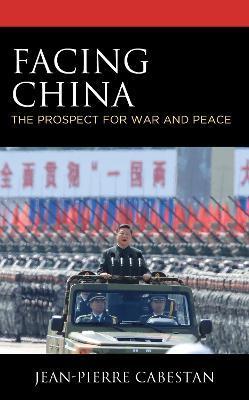Facing China: The Prospect for War and Peace

Facing China: The Prospect for War and Peace
Under Xi Jinping, China has embarked into more aggressive gray zone tactics and operations, especially in the South China Sea and the Taiwan Strait. While this new assertiveness has intensified the likelihood of military crises, especially with the United States, Xi has been keen to remain under the threshold of war. Can this strategy succeed?
Jean-Pierre Cabestan, a China specialist based in Hong Kong, provides an overview of "Thucydides' Trap," as coined by political scientist Graham Allison to describe the inescapable conflict between Beijing and Washington. Is China's growing power a threat to the United States? Could it lead to war between the two nations? Economically and militarily stronger, and more nationalist than ever, the People's Republic of China is increasingly tempted to use force to assert its power, especially in its immediate region. First, the author considers the factors around the threat of war, specifically on the Chinese side, then presents the three most likely armed conflict scenarios: around Taiwan; in the South China Sea; or in the Senkaku Islands under Japanese control. Cabestan also analyses the tensions between China and India along their common borders, which were revived in 2020. But the most likely scenario, according to Cabestan, would be a rapid, piecemeal attack, aimed at tearing borders apart or defending vested interests - not to mention increased cyber warfare. It could also manifest itself as the emergence of a new type of cold war, punctuated by crises bordering on either a nuclear strike or the use of new weapons. U.S.-Chinese tensions and the many potential fronts on which they could elevate are a conflict-in-waiting which will weigh on the 21st century and dominate international life as China seeks to become entrenched as a dominant world power.
PRP: 202.50 Lei
Acesta este Prețul Recomandat de Producător. Prețul de vânzare al produsului este afișat mai jos.
182.25Lei
182.25Lei
202.50 LeiLivrare in 2-4 saptamani
Descrierea produsului
Under Xi Jinping, China has embarked into more aggressive gray zone tactics and operations, especially in the South China Sea and the Taiwan Strait. While this new assertiveness has intensified the likelihood of military crises, especially with the United States, Xi has been keen to remain under the threshold of war. Can this strategy succeed?
Jean-Pierre Cabestan, a China specialist based in Hong Kong, provides an overview of "Thucydides' Trap," as coined by political scientist Graham Allison to describe the inescapable conflict between Beijing and Washington. Is China's growing power a threat to the United States? Could it lead to war between the two nations? Economically and militarily stronger, and more nationalist than ever, the People's Republic of China is increasingly tempted to use force to assert its power, especially in its immediate region. First, the author considers the factors around the threat of war, specifically on the Chinese side, then presents the three most likely armed conflict scenarios: around Taiwan; in the South China Sea; or in the Senkaku Islands under Japanese control. Cabestan also analyses the tensions between China and India along their common borders, which were revived in 2020. But the most likely scenario, according to Cabestan, would be a rapid, piecemeal attack, aimed at tearing borders apart or defending vested interests - not to mention increased cyber warfare. It could also manifest itself as the emergence of a new type of cold war, punctuated by crises bordering on either a nuclear strike or the use of new weapons. U.S.-Chinese tensions and the many potential fronts on which they could elevate are a conflict-in-waiting which will weigh on the 21st century and dominate international life as China seeks to become entrenched as a dominant world power.
Detaliile produsului










